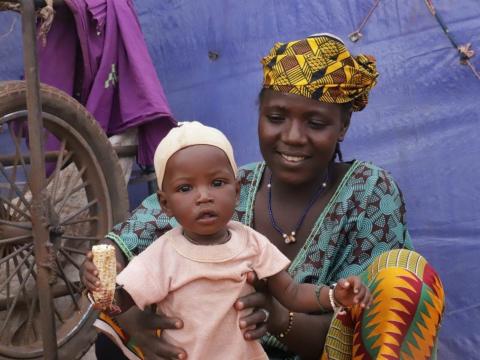For now, this is the safest place to bring up Aruna

By Joelma Pereira, Communications Manager – Mali
The world is becoming an unpredictable and insecure place to live in, where crisis can occur anywhere at any time. Some of the current crises and conflicts are responsible for long-term instability in several countries, with little chance of them ending. Unfortunately, this has been the case in the well-known African nation of Mali since 2012. The recurring period of insecurity has affected an already vulnerable group of people in the north and centre of the country.
The crisis in this country and in its neighbouring countries have been considered by OCHA as one of the fastest-growing humanitarian crises in the world. The scale and severity of humanitarian needs in the three Central Sahel countries (Mali, Niger and Burkina Faso) are unprecedented, with 13.4 million people affected by forced displacement, food insecurity and reduced access to essential basic services.
Fadimata, 20, is an internally displaced mother of little Aruna, who is just seven months old. She is one of those affected by the inter-community crisis in the region of Mopti that began in 2017. The young mother was forced to flee her village after it was attacked by armed groups present in the region.
“I fled my home with my husband and our two boys last August. We had to do it because we feared for our lives. Although I had the chance to survive the attack in my village, after the event I could no longer eat or sleep. Due to fear and not eating, I ran out of milk to breastfeed little Aruna.”
Fadimata's family is one of the lucky ones, because she was able to find refuge at an IDP site in Bamako. Unfortunately, her family suffered a tragedy soon after reaching safety; losing one of the most precious gifts from God.
“A few months after we reached the site, my eldest son passed away due to malaria. He was an active child that hardly fell sick, but the living conditions at the site are not the same. Here, children are exposed to everything." she sadly recalls. "The lack of sanitation makes children sick all the time. It is difficult to protect children from malaria when you don't have a mosquito net,” adds Fadimata, holding little Aruna close to her.
Around 260 families live in Senou IDP site and most of them fled the inter-community conflict in the central region of the country (Koro, Bankass and Douentza) since March 2019. As is to be expected, living conditions are not ideal for over 700 children living with their families there. Even though the site has potable water, thanks to the interventions of various actors, the small health centre and the few public latrines do not offer adequate service to this population.
Although Fadimata's late son was taken to the nearest health centre, he was already in the terminal phase of malaria and doctors could not save him. Despite her loss and the immense difficulties she faces, Fadimata has embraced life and she is determined to protect her baby Aruna.
“Despite my loss, I feel that I have peace here and the food I received today represents an enormous help to my family.” Fadimata is among the families that benefited from two-month food assistance drives through food vouchers.
When asked if she has plans to return home, Fadimata said, "If there was peace back home I would not be here, but for now, this is the safest place to bring up little Aruna."
World Vision's emergency response programme in Mali continues to support IDPs in Mali regardless of their location. Our food assistance project funded by WFP through the Brazilian Embassy in Mali is a good example of this. On November 13-14, 2020, the emergency programme team, in partnership with WFP and Horizon Mali NGO, distributed food vouchers to internally displaced families at Senou. Benefiting families had the opportunity to choose food items from two food suppliers present at the site in the day of distribution.
To learn more about what World Vision is doing to address the crisis in the Central Sahel, click here.